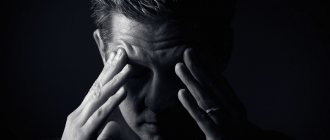Very often, we interpret rapid fatigue and increased exhaustion as consequences of banal overwork and believe that fatigue will go away after rest. However painful weakness often indicates the development of a dangerous pathology - astheno-depressive syndrome.
Astheno-depressive syndrome , at its core, is an independent type of atypical affective disorder, and is often found in the literature under the name “exhaustion depression” or “asthenic depression”. Despite the fact that in the traditional sense, astheno-depressive syndrome cannot be classified as a “pure” depressive disorder, this pathology significantly worsens the standard of living and threatens to develop into severe, intractable depression.
With astheno-depressive syndrome, the organs and systems of the body “work” to the limit of their capabilities. The occurrence of numerous different unpleasant symptoms is a kind of warning sign that requires a person to reconsider his lifestyle and make the required adjustments to the usual rhythm of activity.
Who is susceptible to astheno-depressive syndrome?
Astheno-depressive syndrome, for which special treatment is selected, most often occurs in people who have a predisposition to it. We are talking about people who are at risk. These include:
- Representatives of creative professions;
- Persons holding leadership positions;
- Adults and children who are prone to developing mental illness;
- Patients with inflammatory diseases that are chronic.
People who are at risk should take more responsibility for their physical and mental health. Otherwise, it will be difficult for them to avoid astheno-depressive syndrome.
Possible side effects
Antidepressants are not the safest medications. They often cause a number of side effects. In some cases, they worsen the symptoms of depression.
The most common side effects include:
- decreased sex drive;
- erectile dysfunction;
- pain in the abdomen;
- dysfunction of the gastrointestinal tract;
- bowel dysfunction;
- migraine;
- headache;
- insomnia;
- drowsiness;
- weight gain;
- blurry vision;
- rare urge to urinate;
- dry mouth.
Other side effects are presented in the table.
| Group of drugs | Side effects |
| Selective serotonin reuptake inhibitors | They cause nausea, provoke diarrhea, and contribute to sexual disorders. The simultaneous use of antidepressants can lead to the death of the patient. Against the background of an overdose, thoughts of suicide arise more often than usual. |
| Tricyclic antidepressants | The person becomes very sleepy and lethargic. Frequent dizziness occurs. Sexual problems arise. Weight can grow rapidly without responding to diet and exercise. Rashes appear on the skin. Most often it is acne. |
| Monoamine oxidase inhibitors | An overdose contributes to the development of inflammatory processes in the liver. The risk of stroke and heart attack increases. Severe convulsive seizures appear. When combined with other drugs, blood pressure rises significantly. |
| Selective norepinephrine and dopamine reuptake inhibitors | The person's sleep is disturbed and vague headaches are present. The heart begins to beat strongly and frequently. In rare cases, fainting occurs. The stool is disrupted and a rash appears on the skin. |
Causes of development of astheno-depressive syndrome
Finding out the cause of the development of astheno-depressive syndrome is not so easy. Only an experienced specialist can handle this task. There are many factors that can lead to the development of pathology. In most cases, the disease manifests itself due to the influence of the following negative factors on the human body:
- Prolonged experience of a traumatic situation;
- Hereditary predisposition to the disorder;
- Traumatic brain injuries;
- Mental stress or overload;
- Cardiovascular diseases;
- Weakened immunity;
- Thyroid gland dysfunction;
- Long-term course of vitamin deficiency;
- Various types of intoxication of the body, including alcohol and nicotine;
- Leading a sedentary lifestyle.
Many of these reasons can lead a person into a state of panic. If you don't deal with panic attacks, they begin to intensify. As a result, the patient develops new problems, among which this syndrome stands out. Any shock can lead to the development of mild depression. Gradually, this condition will only worsen if the person fails to find relief. If a man or woman often exposes himself to depressive conditions, then he should seek help from a specialist, since in the future the person risks encountering asthenic-depressive syndrome.
When to see a doctor
If you experience frequent mood changes, manifestations of depression, apathy, or the development of an inferiority complex, you need to make an appointment with a psychotherapist. JSC “Medicine” (academician Roitberg’s clinic) employs qualified specialists and psychotherapists with extensive experience. Experienced neurologists also work on site at the clinic. JSC "Medicine" (clinic of academician Roitberg) is located in the center of Moscow, at 2nd Tverskoy-Yamskaya lane 10, not far from the metro stations Chekhovskaya, Mayakovskaya, Belorusskaya, Novoslobodskaya, Tverskaya.
Symptoms of astheno-depressive syndrome
Characteristic symptoms help determine astheno-depressive syndrome in a person. They are the reason for diagnostics, based on the results of which treatment is prescribed. A patient with a mental disorder may experience only a few symptoms. As a rule, many people do not pay much attention to them, as they attribute them to ordinary fatigue. The painful condition can be recognized by the following symptoms:
- Unreasonable loss of interest in events that occur in a person’s life;
- Constant irritability and aggressiveness, which manifests itself for any reason;
- Inability to complete the work started;
- Sudden mood changes several times a day;
- Inability to concentrate normally on a specific topic during a conversation or activity;
- The development of phobias that did not previously bother the person;
- Frequent panic attacks;
- Excessive appetite or its complete absence;
- The patient may also experience worsening sleep. He begins to suffer from insomnia, which he is unable to cope with;
- Bradypsia is inhibition of thinking. A person's reaction speed decreases, speech and motor activity slow down.
The main symptoms of astheno-depressive syndrome are complemented by physiological signs of malaise. People with this disorder may experience episodes of tachycardia, shortness of breath, excessive sweating, persistent headaches and nausea. Along with this, diseases appear that disrupt the functioning of internal systems.
Often people complain of non-existent pain in the body. The manifestation of the disease can be observed not only in adults. Children also complain of signs of astheno-depressive syndrome. Parents should start sounding the alarm if they notice the following symptoms in their child:
- Unreasonable weight loss;
- Abrupt change of activities every 30 minutes;
- Unsociability and self-isolation;
- Insomnia.
If a child suffers from constant mental stress and leads a sedentary lifestyle, then he can become hostage to asthenic-depressive syndrome.
Asthenia
Anxiety and depression are underestimated. But asthenia is the most common symptom of many conditions. Defined as a decrease in vitality and energy.
Asthenia has a broad nosological interpretation in the medical literature. Silas Weir Mitchell, one of the first doctors to use the term asthenia.
Further, neurologists enriched the meaning by adding to the definition a decrease in the number of thoughts, actions, and a slowdown in reaction time. Indifference to generally accepted social practices, lack of initiative, and spontaneity are typical and are accompanied by a reluctance to solve complex problems.
Excessive irritability, emotional lability, mental inertia, misunderstanding, decreased range of mental activity. Victor and Ropper coined the term “psychomotor asthenia.” MacCabe separated mental asthenia from depression.
Diagnosis of astheno-depressive syndrome
Adults and children with severe symptoms of astheno-depressive syndrome must undergo diagnostics. You should consult a doctor, even if the signs of the disorder are still mild. Patients suspected of having this disease should be examined in the office of highly specialized specialists. We are talking about an endocrinologist, neurologist, gastroenterologist and urologist. For depression, it is recommended to consult a psychotherapist. He will determine the root cause of the disorder and tell you how to treat it. Consultation with highly specialized doctors is required in order to identify the presence of chronic pathologies that could have an impact on the development of astheno-depressive syndrome. If no organic causes of the disease are identified in a person, then further diagnosis will be carried out by a psychotherapist. He must talk to the patient. During the collection of anamnesis, he will be able to find an explanation for the manifested symptoms of the syndrome.
The Yusupov Hospital has a modern diagnostic facility, and specialists treat patient complaints carefully and thoughtfully. Yusupov Hospital is a multidisciplinary treatment center where every person is guaranteed comprehensive and highly qualified treatment.
Treatment recommendations
Treatment of the syndrome must be comprehensive and carried out under the supervision of a specialist. Mandatory measures in treating the condition are:
- Correction of the diet, inclusion of foods rich in vitamins and microelements in the menu.
- Proper distribution of workload throughout the day. It is necessary to allocate time for yourself to rest. In the evening before going to bed, you should definitely relax.
- Dosed physical activity - training in the gym, swimming in the pool, jogging or walking in the fresh air.
- Dancing, yoga, and cycling can be helpful.
If necessary, the doctor may prescribe medication. It includes drugs from the following pharmacological groups:
- Antidepressants.
- Tranquilizers.
- Nootropics.
- Adaptogens.
- Antioxidants.
You should take medications only as prescribed by a doctor and under his strict supervision. Effective methods for correcting the emotional background can be:
- Psychotherapy.
- Physiotherapeutic methods - massage, aromatherapy, pearl baths, etc.
What does depression mean?
Absolutely anyone can get the syndrome. Not every individual realizes that he has signs of a mental disorder. He attributes all his problems to poor sleep, food, lack of time, etc. This disease does not go away on its own, and you definitely need to get rid of it.
Symptoms of depression can also occur in children and adolescents. They are slightly different from adults:
- poor sleep or insomnia;
- lack of appetite;
- anxiety;
- suspicion;
- aggressiveness;
- isolation;
- persecution mania;
The syndrome can lead a person to become withdrawn
- various phobias;
- poor performance at school;
- difficulty in understanding with parents;
- conflicts with classmates and teachers.
All this must be detected and treated in time. A prolonged state of apathy can be life-threatening, because a large number of victims think about death. Remember that everything is curable, the main thing is the desire of the sick person and the help of a professional. Psychiatrists, therapists, endocrinologists and psychologists will help a person with depression.
Diet
A special diet will help with successful treatment. It even happens that when using it, a person may not need antidepressants at all. What does the antidepressant diet recommend:
- Eating porridge.
- Nuts.
- Dried fruits.
- Be sure to supplement your diet with legumes.
It is also necessary to eat lean meat, eggs, and dairy products. You definitely need to take a course of vitamins. You can use a complex for pregnant women - these vitamins usually have the most balanced composition. It is recommended to exclude sweets as much as possible. You should especially not eat fatty, rich sweets, as consuming them only intensifies the symptoms of the syndrome. You can use dark chocolate or bananas; dates and prunes with honey are also excellent substitutes for sweets.











